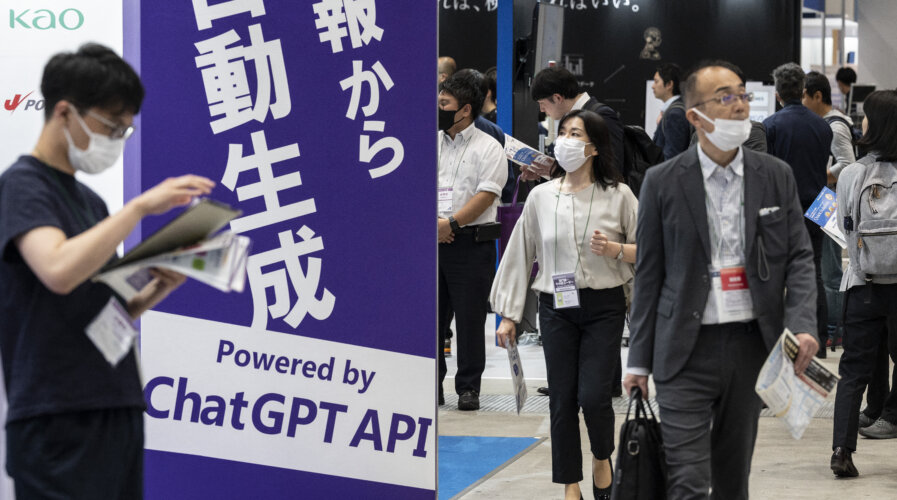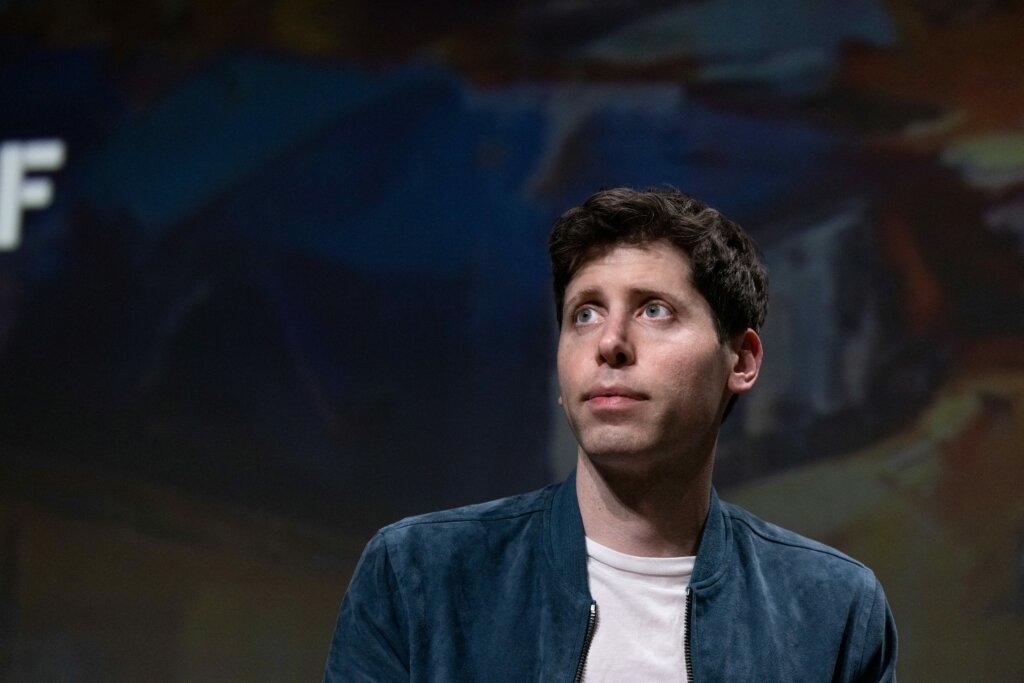
Visitors walk past a sign promoting ChatGPT, a hugely popular language app that has sparked a rush in artificial intelligence technology, during the three-day 7th AI Expo, part of NexTech Week Tokyo 2023, Japan’s largest trade show for artificial intelligence technology companies, at Tokyo Big Sight on May 10, 2023. (Photo by Richard A. Brooks / AFP)
After Italy, Japan has its eyes on ChatGPT over data privacy concerns
- Japanese watchdog warns OpenAI not to collect data without permission.
- The Personal Information Protection Commission may take further action.
When concerns over OpenAI-owned ChatGPT increased in many countries, the government in Japan came forward to clarify that they are among those that are not considering regulating the artificial intelligence (AI) chatbot. Chief Cabinet Secretary Hirokazu Matsuno shared the stance at a parliamentary committee meeting on April 14, around the same period when Italian authorities were moving to ban the use of ChatGPT to protect personal data temporarily.
At the same committee meeting, economic security minister Sanae Takaichi underlined the importance of measures to reduce the risk of personal data leaks involving the technology while iterating that there is no need to regulate ChatGPT. Meanwhile, officials in Japan have also said the country’s government is considering using ChatGPT in administrative work to streamline processes like preparing answers to parliamentary questions and reducing the burden on public servants.
“We will pursue the possibility of using (ChatGPT) to reduce the workload of national public servants,” economy minister Yasutoshi Nishimura said at a news conference in April, citing the creation of responses to parliamentary questions as an example.
However, Kenta Izumi, leader of the main opposition party, the Constitutional Democratic Party of Japan, told a news conference that rules on using ChatGPT would be needed. In his defense, ChatGPT could lead to mistakes in answering parliamentary questions and in official documents if it is used in administrative work in Japan.
Fast forward to last week, the Japanese privacy watchdog echoed Izumi’s stance and warned OpenAI not to collect sensitive data without permission.
In a statement, the Personal Information Protection Commission said that OpenAI should minimize the sensitive data it collects for machine learning, adding it may take further action if it has more concerns. According to an article by the South China Morning Post (SCMP), the watchdog noted the need to balance privacy concerns with the potential benefits of generative AI, including accelerating innovation and dealing with problems such as climate change.
The updates from the country’s watchdog came after OpenAI CEO Sam Altman visited Japan in April, where he met Prime Minister Fumio Kishida with an eye to expansion in Japan. The meeting was also ahead of the Group of Seven (G7) leaders summit, where Kishida led a discussion on regulating AI. Italian regulator Garante had ChatGPT taken offline until the company agreed to install age verification features and let European users block their information from being used to train the system.

OpenAI CEO Sam Altman addresses a speech during a meeting, at the Station F in Paris on May 26, 2023. Altman, the boss of OpenAI, the firm behind the massively popular ChatGPT bot, said on May 26, 2023, in Paris that his firm’s technology would not destroy the job market as he sought to calm fears about the march of artificial intelligence (AI). (Photo by JOEL SAGET / AFP)
What’s next after Japan in regulatory hurdles for ChatGPT?
When Italy became the first Western country to ban ChatGPT temporarily, the alarm went off in the industry with more than 5,000 people signing an open letter urging a pause in AI development, saying that if researchers do not pull back in this “out-of-control race,” governments should step in.
The CEO of OpenAI also appeared before Congress and told US lawmakers last month that regulating artificial intelligence is essential. “If this technology goes wrong, it can go quite wrong,” Altman said in his first appearance before Congress on May 16.
Unfortunately, though, Altman’s charm offensive during his Senate hearing did not work as well during his excursion in Europe last month. It backfired as Altman’s call for regulation has not been muddled by the reality of the European Union’s planned AI Act. At that point, Altman was in the midst of a ‘tour’ around Europe to reassure AI doom-mongers and explain how he thinks the technology could reinvigorate economies.
Altman said the EU’s AI Act was “not inherently flawed,” but “the subtle details here really matter.” Even during an on-stage interview on May 24, Altman noted his preference for regulation was “something between the traditional European approach and the traditional US approach.”
He signaled a possible exit from Europe should the regulation come into force. His statements were the starkest sign yet of a growing transatlantic rift over how to control technology.
However, less than 48 hours after his initial comments about potentially ceasing operations in Europe, the OpenAI CEO tweeted that it has been a “very productive week of conversations in Europe about how to regulate AI best,” adding that the OpenAI team is “excited to continue to operate here and of course have no plans to leave.”
Japan and Italy’s warning and action against ChatGPT prove that OpenAI has challenging times ahead. As more countries and companies look to include generative AI in their operations, Altman can only anticipate more scrutiny due to the need for proper regulations worldwide.
READ MORE
- Ethical AI: The renewed importance of safeguarding data and customer privacy in Generative AI applications
- How Japan balances AI-driven opportunities with cybersecurity needs
- Deploying SASE: Benchmarking your approach
- Insurance everywhere all at once: the digital transformation of the APAC insurance industry
- Google parent Alphabet eyes HubSpot: A potential acquisition shaping the future of CRM


